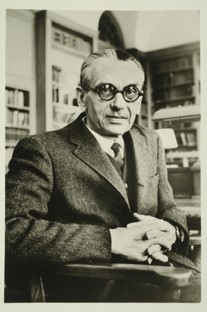Kurt Gödel
Kurt Gödel (1906-1978) was an Austrian mathematician who did pioneering work in logic and the foundations of mathematics. His Incompleteness Theorem demonstrated some limitations of the program that would have placed all of mathematics on an axiomatic basis.
Gödel published his remarkable proof in 1931. He showed that in any consistent axiomatic mathematical system there are always propositions that cannot be proved or disproved using the axioms of the system. He additionally showed that it is impossible to prove the consistency of the axioms from those same axioms. This was the famous incompleteness theorem: any axiomatic system powerful enough to describe arithmetic on natural numbers cannot be both consistent and complete. Moreover, the consistency of the axioms cannot be proven within the system.
Godel's work abruptly ended a half-century of attempts, beginning with the work of Frege and culminating in Principia Mathematica and Hilbert's formalism, to find a set of axioms sufficient to prove the consistency of all mathematics. The incompleteness theorems also imply that not all mathematical questions are computable.
This demonstrated the folly of the work of several leaders in the field. Bertrand Russell had already published, in Principia Mathematica (1910-13), a massive attempt to axiomatize mathematics. Gödel's proof also showed that the formalist approach of David Hilbert was bound to fail to prove consistency.
Gödel's proof was a landmark for mathematics, demonstrated that it can never be a finished project as many mathematicians had believed.
